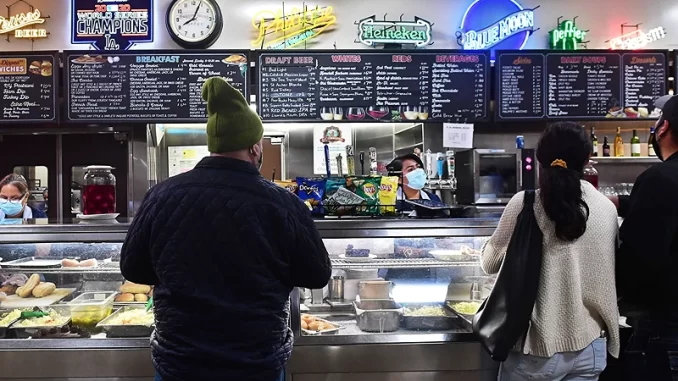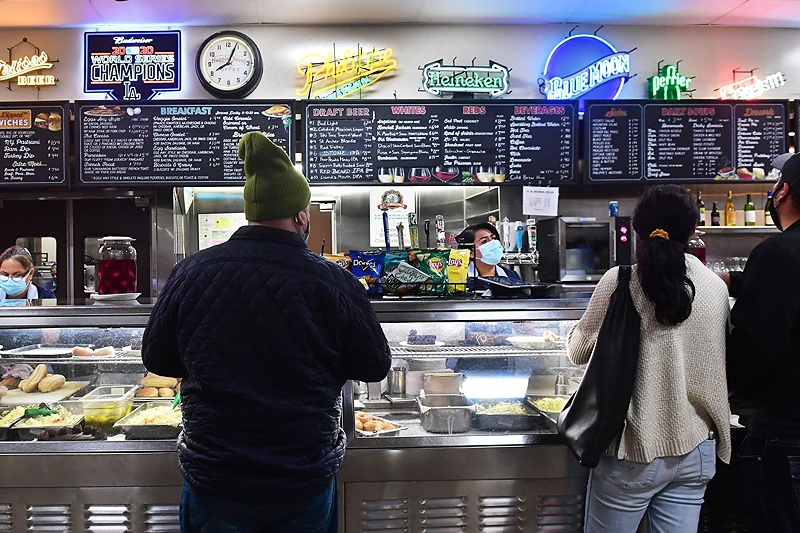

OAN’s Brooke Mallory
11:08 AM – Friday, May 10, 2024
New California state legislation will prohibit unadvertised extra fees and surcharges added at the end of the bill.
Advertisement
Beginning on July 1st, restaurants and California businesses will have to list all obligatory fees and extra charges in the initial pricing they show or advertise, just like thousands of other businesses, such as short-term rental apps, hotels, and food delivery services.
In the weeks following Governor Gavin Newsom’s (D-Calif.) signing of the bill into law last year, the state attorney general’s office issued a mixed message to different news outlets, stating to some outlets that restaurants “could continue to keep their current prices while listing any surcharges on their menus,” and others, “that the surcharges had to be included in the prices themselves,” the Los Angeles Times reported. This has prompted much confusion.
A set of instructions was released by the office of Attorney General Rob Bonta on Wednesday in order to address this matter and address additional inquiries regarding the new law’s requirements for businesses. Along with co-author state Senators Bill Dodd (D-Napa) and Nancy Skinner (D-Berkeley), Bonta was the main sponsor of the bill, Senate Bill 478.
The message implied that it will no longer be sufficient for restaurants to simply include extra service fees and surcharges in fine print on a bill or menu or at the end of purchasing. Rather, the displayed prices listed on the menu must already account for these fees. However, this does not include government tax.
For instance, in a restaurant that displays a flyer promoting a $10 lunch buffet that automatically adds a 10% “service charge” at the end of the meal, it must now say that it is a “$11 lunch buffet.”
Meanwhile, the Golden Gate Restaurant Association said that Bonta’s new guidelines “will create significant challenges for the restaurant industry moving forward.”
The restaurant industry advocacy group claims that the new law will exacerbate issues already faced by the already troubled industry by outlawing the long-standing practice of utilizing service charges to raise employee pay or defray the cost of local ordinances, such as San Francisco’s requirement that businesses spend a minimum amount on healthcare services.
“Diners will not pay less, instead, they will see significant menu price increases, which we believe will further cause them to pull back on dining out,” the statement said. “Not only will restaurants struggle, but workers will lose hours and jobs.”
The authors of the measure state that, with very few exceptions, all companies in California will not be allowed to advertise, display, or offer a price for their goods or services that does not include all of the “mandatory fees or charges” aside from taxes or fees levied by the government, or “reasonable shipping costs.”
“Put simply, the price a Californian sees should be the price they pay,” Bonta’s office said in a release.
Companies will still be free to determine their own prices, but the amount listed online or on the menu must match the total cost that appears on the customer’s final bill. Businesses are able to exclude shipping and tax costs, but “handling costs have to be included.” The cost of removing an item from the shelf and transporting it to a shipping company must be included in the listed price, yet actual postage or delivery fees can be removed.
In terms of the law, it is also not necessary to promote additional costs “for upgraded features or services.” This could apply to the cost of getting your baggage checked or seat upgrades on airlines.
“What about fines or additional costs for guests who smoke in hotel rooms?” The instructions from Bonta’s office state that the fees do not need to be mentioned because “they can be avoided.”
Companies will not be able to avoid the law by promoting one price and then warning clients or customers that there may be additional costs at the end. Although, a company is able to provide a comprehensive explanation of all associated costs to customers and list the entire cost of the product.
Additionally, Bonta provided some advice to companies that claim they are unsure of the final cost before their work or services are completed. According to his recommendations, these companies “should wait to display a price until they know how much they will charge.”
This may have an impact on how live music enthusiasts and ticket sellers for concerts and other live events communicate. Tickets for live events can cost up to 40% more due to hidden surcharges, according to nonprofit consumer watchdog Consumer Reports.
In response to the law’s critics, Bonta stated that California can guarantee consumer openness without waiting for federal action. In a statement, he said that the practice of concealing obligatory charges “is deceptive and unfair to consumers wherever it occurs—not just in certain industries.”
Stay informed! Receive breaking news blasts directly to your inbox for free. Subscribe here. https://www.oann.com/alerts

